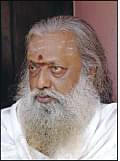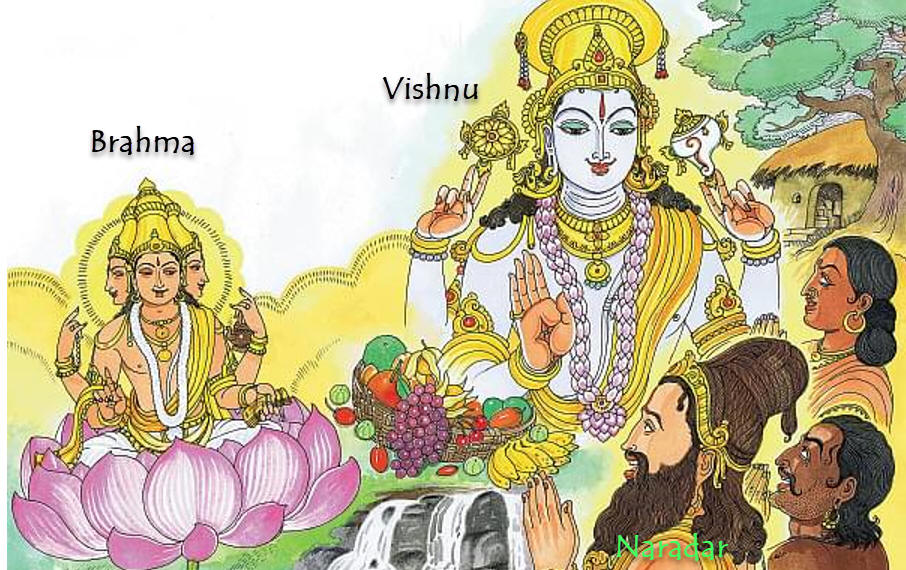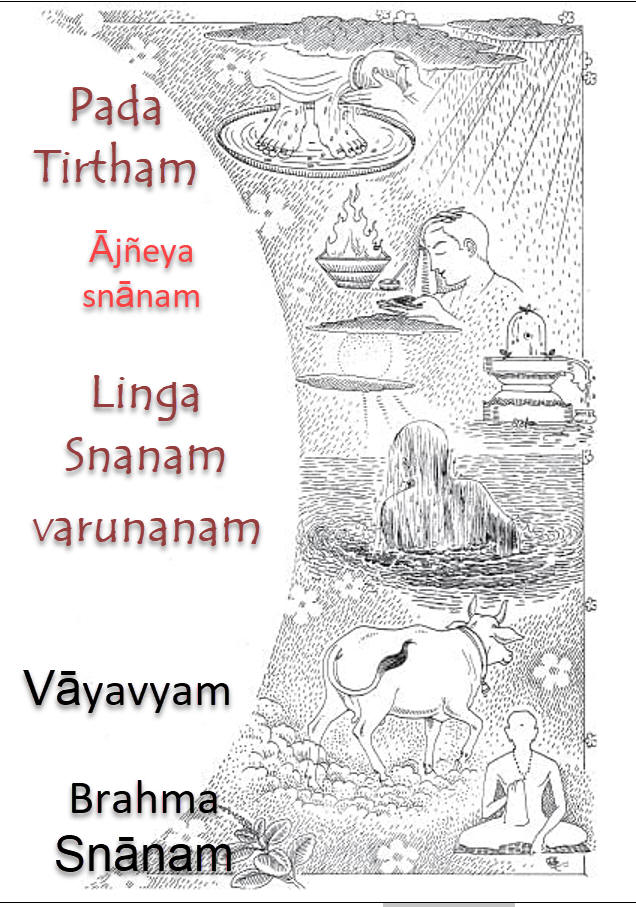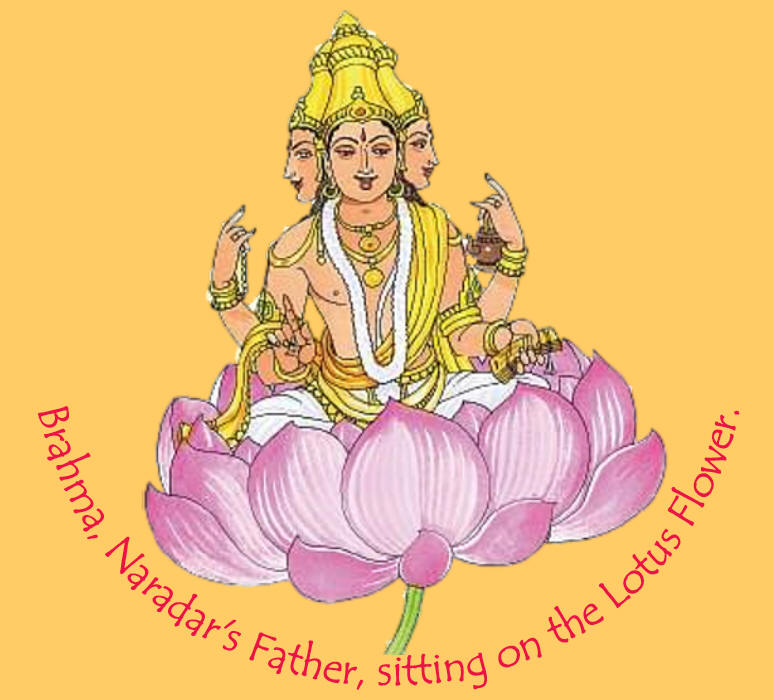Published:23 Dec 2013 7 PMUpdated:23 Dec 2013 7 PM Sakthi Vikatan
Vikatan Correspondent

The four-Vedas essence: By Wordsmith Balakumaran. Images by Padmavasan
2. Body cleansing by immersion in the holy waters of the rivers is possible. Does that also purify the mind? How does it earn merits?
3. Narada Maharishi addressed his father, who is also the God of creation. He knew he could get answers to subtle questions from his father, which prompted Naradar to ask his father the following question.
4. Naradar: 'No one can approach the God of Creation to engage in a Q&A with him. On the contrary, as his son, I could go to my father, the ordinary people, and the learned Pundits to grasp the subtle tenets and spread them to all people. Is it not true that the four-headed Brahma's sayings are those of a Deva? Naradar, with a pure heart, took upon himself bringing these tenets to the attention of the ordinary people.
5. Naradar had an intense liking for ordinary people.

7. Whosoever is introspective, he acquires Jnanam (experiential wisdom). Early morning bathing cools the body and the mind, offering promising results. The bathing is of ten kinds. As I list and explain them, mentally note them.
8. Vāruṇam. Instead of swimming in the holy waters, the ritualist must face east, chant the mantras, and immerse the head in the waters a few times. This proper bathing in the river is Vāruṇam (related to Vārunam or river, lake or sea வாருணம் = Vāruṇam = That which relates to Varuṇa, the Lord of waters.
9. Wearing the ash, when obtained from Agni Hotram and applied on the head and the mid-forehead, becomes Ājñeya snānam (the mid-forehead has the Ajña Chakra). Soaking wet when the sun beats down on you is good for you. The dust rising from the cow's hoof-print and falling on your body is Vāyavyam (Wind-Snānam). Vāyu = wind.
10. With no bathing in water, chanting Mantras in a sitting position is Brahma Snānam. Water from Tulasi-water vessel, water draining from Sivalingam, water draining from the cow's horns, the foot-ablution water from the Vedic scholars, and water from Guru's feet ablution, when sprinkled on the heads, are an important Snānam.
11. Though the Snānams can put people in the virtuous path, the highest of all Snānams is holding no desire in mind, and doing one's duty faithfully.
12. The object of Snānam is purification. What will purify a person? The highest Snānam is tranquility and lack of desire. Mind with no desires is purity, calmness, tranquility, and service at the feet of God. Let me tell you a story of such a Pure Snānam. As the four-faced Brahma suggested, Naradar opposed his hands and begged him to tell the story.

13. "A poor man of the village had no land of his own, went to the forest to collect fruits, vegetables and greens and cooked them to eat. He gleaned leftover grains, gave them to his wife to cook, and asked no one for help. He never had the feeling he was poor and felt happy all the time. He went to the town, did odd jobs, accepted the wages, bought clothes and necessities, and gave them to his wife. His wife scolded him for not owning property and living comfortably.
14. He addressed his wife's concerns. "The forest is full of fruits and grains. Why should we give them up and earn more than we need? We have enough clothes to wear. What will we do, having more clothes? We have a good open, airy house, and a river by the side for drinking water. Why should we accumulate wealth under these conditions? With the open house, we don't have to worry about thieves. We can entertain guests with fruits and grains gleaned in the forest. What do we need, you think, more than what we have? For me, this is enough."

15. His wife prayed to God to bring money into the hands of her husband. She begged God to change his mind. God responded to her plea.
16. God placed a Gold bar on his way when her husband went to the forest to get fruits and vegetables. He picked up and examined the bar.
17. "Adedē! I could use this gold bar to buy whatever my wife wants. Why should I not take this? His mind was hesitant.
18. God watched what he was doing. He mused, 'I take from the forest fruits and vegetables and eat them. Likewise, I got the gold bar in the forest. What is wrong with taking the bar? I am not begging for it and not causing harm to others to get the bar. It is not even wages for my work. Why should I not sell the bar, get cash, and buy my needs? God gave me the gold bar as he gives fruits and vegetables. There is nothing wrong in taking it.'
19. He picked up the God bar and carried it on his head. Another thought popped into his head. 'Never take it. I should never accumulate riches. I do not want this gold bar. I have fruits, vegetables, greens, and water to quench my hunger and thirst. That is enough. I need nothing else.' He dropped the Gold bar and walked to his house.
20. Narayanan took the guise of an astrologer and went to his wife and said, "According to your husband's astrology, he should have obtained a gold bar. He discarded the bar and was on his way home, a mistake on his part. Poverty is in his future. Ask him to bring the gold bar."
21. When the poor man came home, his wife inquired her husband and narrated what the astrologer told her.
The poor man said, "Yes, I saw a gold bar. I left it there. Why do I need a gold bar?"
The wife: "Go forthwith and fetch the bar. Or tell me where it is, and I will bring it home."
The wife fell at the astrologer's feet and asked him to change her husband’s mind.
The astrologer said, "Sri Devi comes to your home on her own accord. Why do you reject and push her away? Bring it."22. The poor man: "If I have the gold in the house, I will have the fear to safeguard it. If the relatives discover, they will ask for a portion with ensuing disputes and troubles. The thieves will arrive to take it away, engage in fights, and will inflict bodily harm. Why should I bring the gold bar and earn enmity from jealous people? I am at peace with myself, and that is enough for me. I don't need the gold."
He went inside the house and sat down. His wife looked at the visitor in a confused manner. Narayana, the visitor in the guise of the astrologer, showed his Divine Form to the couple. Recovering from her swoon, she gained clarity of vision.
23. Brahman: "Narada! Here is what I understand from this episode? The great Dharma is to live with no desire, and conquering anger is the greatest and meritorious Snānam. The great Japam is to have a merciful soul, and contentment is wealth. Vegetarian foods are ambrosia. Fasting is penance. A person with these attributes is a pure soul who lives here and hereafter well.
24. Naradar acquired clarity of vision and paid homage to his father. He left to spread this message to others.